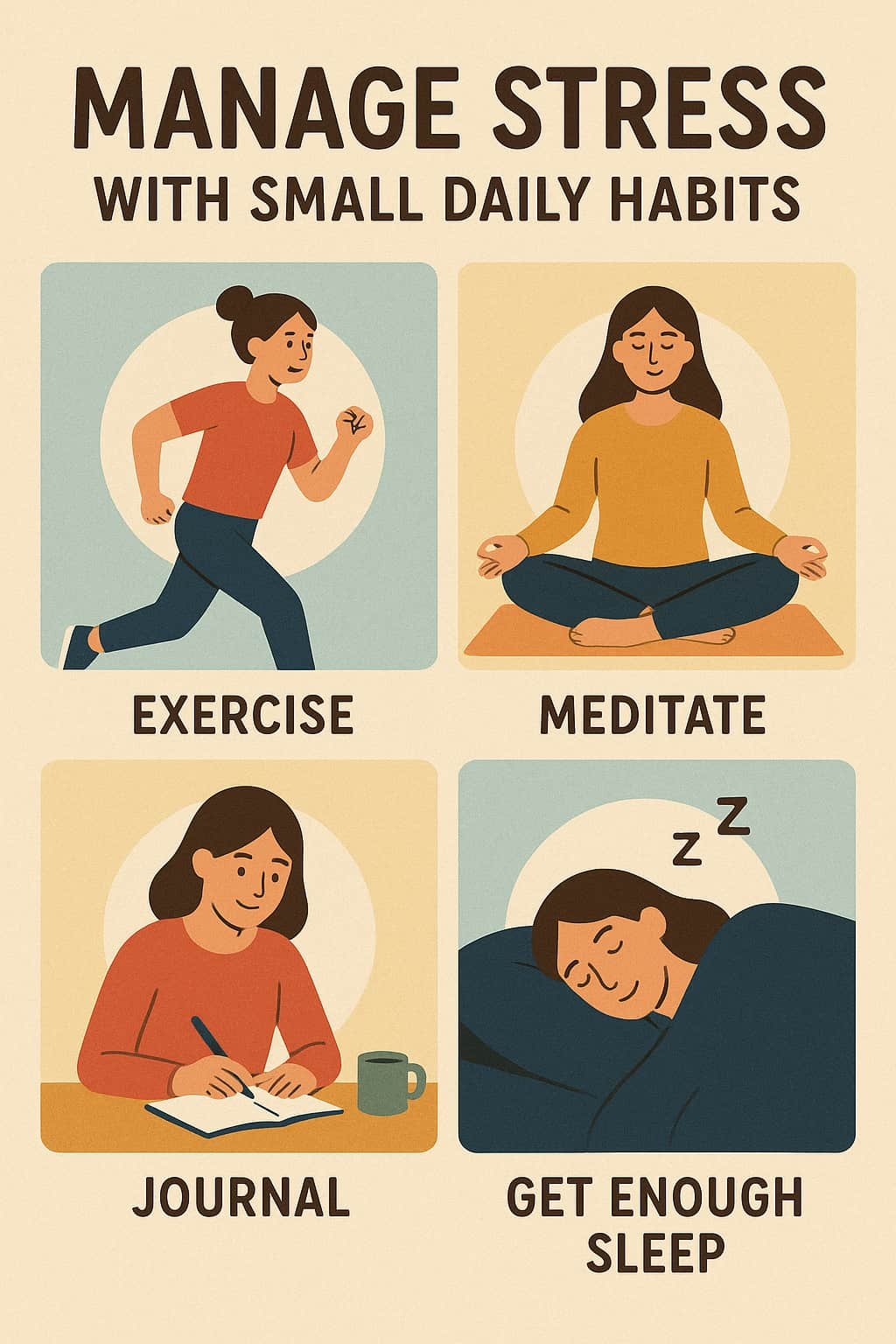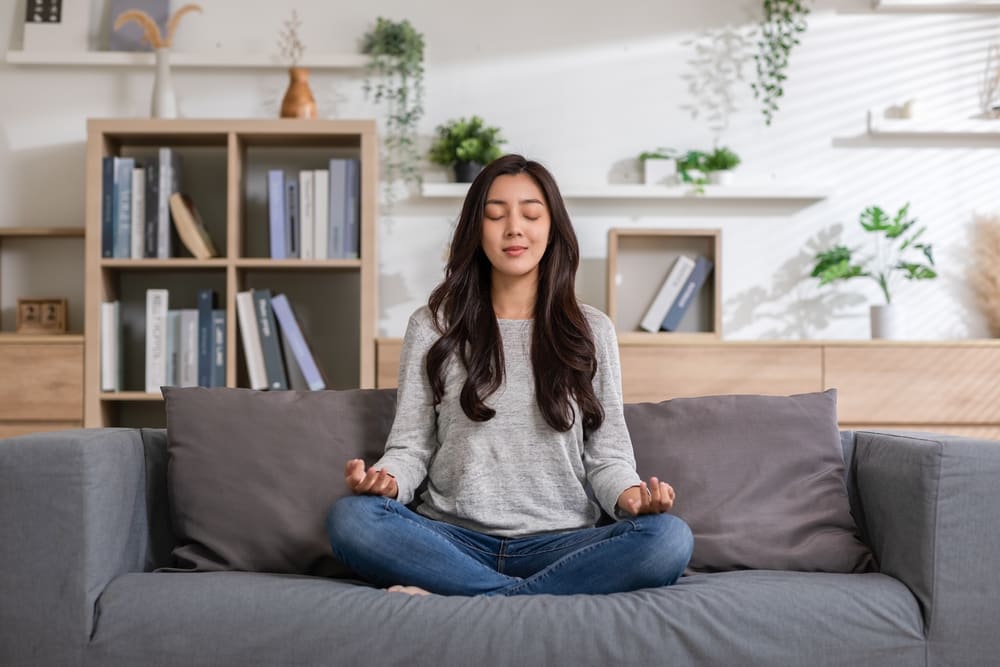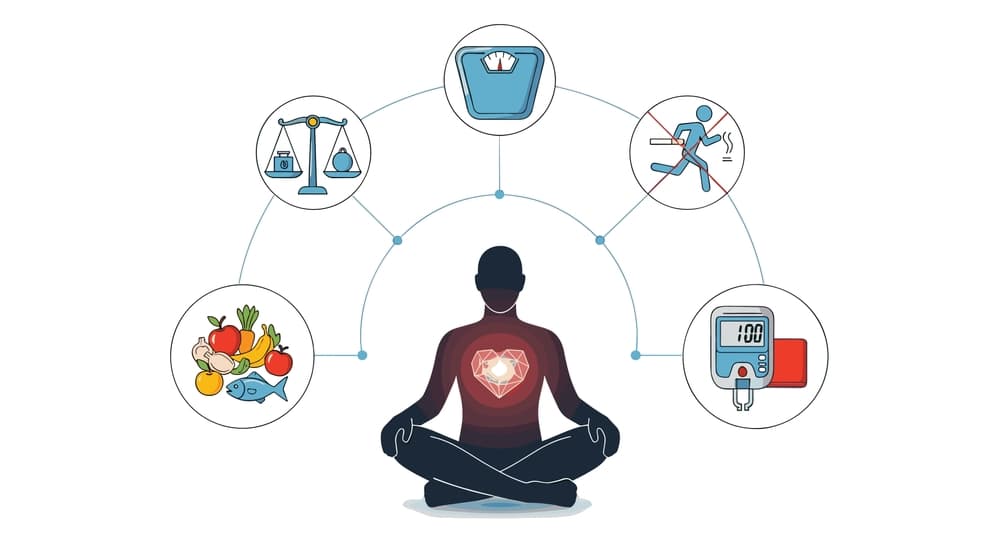How to manage stress with small daily habits


How to manage stress with small daily habits to stay calm, focused, and improve your overall well-being.
Work commitments, social expectations, or personal challenges are all contributing to our stress levels every day. Many people think you need to make significant lifestyle changes to reduce stress, but the truth is, you don’t need to do anything meaningful. Manage stress with small daily habits. The idea is that small but regular habits like breathing mindfully, exercising lightly, eating right, or practicing gratitude can gradually calm your mind and body. Over time, these small habits increase your mental strength, focus, and bring balance to your life.
Today, we will discuss some daily habits that will gradually reduce your stress. And you will find a beautiful life.
Start Your Day with Mindful Morning Habits
According to Mayo Clinic, short morning meditation can reduce anxiety and bring calmness throughout the day.


Your mood and stress management throughout the day largely depend on how you start your morning. Instead of starting your day in a hurry, you can start with some mindful habits that calm your mind and prepare you to face the day’s challenges.
Here are some small habits you can develop to manage stress in the morning:
‘Screen-free’ morning
Avoid looking at your phone or laptop screen first thing in the morning. Immersing yourself in emails, social media, or negative news at the beginning of the day can instantly increase stress. Keep your phone in another room or out of reach for the first 30 to 60 minutes. This protects your brain from external distractions and helps you focus on your inner peace.
Express gratitude
Expressing gratitude for the good things in your life before starting each day fills your mind with positivity.
Keep a ‘gratitude journal’. When you wake up in the morning, quickly write down three things you are truly grateful for (such as a good night’s sleep, a cup of hot tea, or a loved one’s smile). This shifts your focus from problems to solutions and the positive aspects of life.
Light stretching or yoga
A little light movement in the morning is all you need to wake up your body and reduce muscle tension. This does not require strenuous exercise. Do simple stretches like yoga for 10-15 minutes. This will increase your blood circulation and refresh your body.
Physical activity releases ‘feel-good’ hormones called endorphins, which improve your mood and reduce stress.
Learn More: The role of yoga in improving mental wellness
Set goals for the day
Decide on the main tasks of the day in the morning and how you want to feel. This will give you a sense of control at the beginning of the day. Instead of making a to-do list, set a maximum of 3 essential tasks for the day. Also, tell yourself, “Today I will be calm” or “Today I will be patient.” This clarifies your focus and reduces the stress of unfinished tasks at the end of the day.
Eat for a Calm Mind
The APA found that healthy eating and regular exercise improve stress resilience and emotional balance.
Add stress-fighting foods
Add some foods to your diet that help control the stress hormone called cortisol:
Omega-3 fatty acids: These improve brain health and help reduce anxiety. Eat a handful of walnuts, flax seeds, or chia seeds every morning or for breakfast. Eat fatty fish at least once a week.
Fermented foods: Gut health is deeply linked to mental health. These foods support the growth of good bacteria in the gut.
Habit: Eat a small amount of sour yogurt or pickles every day.
Green vegetables: Green vegetables like spinach contain magnesium, which acts as a natural sedative. Add a bowl of spinach or broccoli to your lunch or dinner.
Limit sugar, caffeine, and processed foods
Some foods may provide temporary relief but increase stress in the long run.
Excess sugar: A sudden spike in blood sugar can trigger mood swings and increase feelings of stress when it drops too quickly. Eat fruits instead of sugary drinks or desserts.
Excess caffeine: Caffeine can temporarily boost your mood, but it can also increase anxiety levels.
Habit: Avoid drinking coffee or tea after midday. You can choose herbal tea or green tea instead of coffee in the morning.
Eat mindfully and drink water
While eating, keep your mind calm, not just your stomach.
Mindful eating: While eating, focus on the taste, smell, and texture of the food rather than the phone, TV, or work.
Eat at least one meal slowly and with full attention. This also makes you feel full faster and improves digestion.
Drink enough water: Even mild dehydration can increase stress and fatigue.
Make sure you drink enough water every day. Start your day by drinking a glass of water as soon as you wake up.
Mindful breathing


Mindful breathing is a simple practice of paying full conscious attention to your breathing in the present moment. It is one of the most effective techniques to quickly calm your mind and body during times of stress or anxiety. It does not require any special equipment or space; you can do this practice anytime, anywhere.
Why do mindful breathing?
When you are stressed, your breathing becomes rapid and shallow. Mindful breathing activates your parasympathetic nervous system, resulting in:
Reduces stress hormones: The release of cortisol, a stress hormone, is reduced.
Calms the mind: The mind returns to the present moment after being distracted by thoughts.
Heart rate decreases: Your heart rate slows, and your blood pressure is better controlled.
Easy way to do mindful breathing (The 4-7-8 Technique)
You can follow this technique for just 5 minutes daily:
Comfortable position: Sit or lie down comfortably. Keep your shoulders relaxed. Place the tip of your tongue gently just behind your upper teeth.
Empty the lungs: Make a sound through your mouth and expel all the air from your lungs.
Inhale for 4 seconds: Breathe in slowly and deeply through your nose for 4 seconds. Feel your stomach filling up.
Hold your breath for 7 seconds: Hold your breath for 7 seconds.
Exhale for 8 seconds: Exhale slowly for 8 seconds with a sound through your mouth.
Repeat: Repeat this cycle at least 4 times.
Learn More: Best morning mindfulness exercises for a positive day
Tips for making it a daily habit
Set a time: 5 minutes after waking up in the morning or before going to bed at night.
Use a trigger: Whenever you see a notification on your phone or are waiting for something (such as a traffic light), take a deep breath for 1 minute.
Start small: You don’t need to do it for a long time at first. Even doing it for 1 minute 3 times a day will benefit you.
Manage Screen Time & Digital Detox
Mobile phones and other digital devices are one of the reasons for our stress. One after another, notifications and excessive social media keep our brains overstimulated, resulting in increased stress. To reduce stress, it is critical to change your screen usage habits and do a regular ‘digital detox’.
Create a ‘screen-free zone’
One of the biggest bad habits we have these days is looking at our mobile phones while eating. As a result, we cannot eat mindfully. It is better to keep the mobile phones away while eating so that you can enjoy your food and establish meaningful connections with family or friends. And keep your bedroom screen free, stop looking at your mobile phone 1 hour before going to bed. This helps release the melanin hormone, which is very important for good sleep. Good sleep means less stress.
Control notifications
Each notification causes a small stress or distraction. Change this mindset of being ready for everything.
Turn off unnecessary apps: Disable notifications for all non-essential apps. Keep only essential notifications like calls or text messages on.
Do Not Disturb: Use ‘Do Not Disturb’ mode during specific work hours or during rest periods.
Benefits: It helps you stay focused and reduces the urge to check your phone repeatedly, reducing stress.
Purposeful screen time
By giving up the habit of mindless scrolling or ‘doomscrolling’, decide what you are using your device for.
Set a time limit: Set a specific time limit for social media or news apps each day (e.g., 30 minutes) and stick to it.
Create a routine: Create a routine for which apps or content you will look at in the morning and at night. Avoid harmful or worrying content.
Benefits: This will give you control over your time, which is an integral part of stress management.
Digital detox once a week
Take a complete digital break regularly.
Pick a day: Choose at least one day a week (e.g., Sunday) when you will limit or completely turn off your device use.
Engage in alternative activities: Read a book, go for a walk, garden, or spend face-to-face time with friends and family.
Benefits: This practice frees your mind from the overstimulation of the digital world, increases your creativity, and helps you be mindful of the present.
Prioritize Sleep


Sleep is the most effective solution to reduce stress. Lack of sleep directly increases your stress hormones and distracts your mind. By taking proper care of your sleep, you can ‘reset’ your body and mind for the day.
Fixed schedule: Make a habit of sleeping 7-8 hours every night. And go to bed and wake up at the same time each night and morning.
Sleep environment: Keep your bedroom calm, dark, and quiet. Use your bed only for sleep.
Relaxing routine: Turn off all digital devices at least 30 minutes before bed. A warm bath or reading a book will calm the mind.
Food precautions: Avoid caffeine, alcohol, and heavy meals in the evening.
Connect with People
Establishing meaningful connections with people is a compelling way to cope with stress. Social support acts as a buffer, keeping you away from loneliness and depression during difficult times.
Develop some small daily habits for this:
Open Discussion: Talk regularly with a trusted friend or family member. Expressing your feelings and concerns can lighten the load on your mind.
Face-to-face time: Spend as much time as possible in person, rather than communicating over the phone or social media.
Be an active listener: Listen attentively to what others have to say, not just to yourself. This will deepen your connection.
Small Initiatives: Make positive contact with at least one person every day, whether it’s a neighbor or a coworker.
FAQ
Q 1: What are the best small daily habits to reduce stress?
A: Deep breathing, short meditation, light exercise, healthy eating, and good sleep help reduce daily stress.
Q 2: How long does it take to see results?
A: You may feel calmer within a week; lasting results appear after 3–4 weeks of consistent practice.
Wrapping Up: How to Manage Stress with Small Daily Habits
We’ve seen that while it’s not possible to eliminate stress from your life completely, you can manage it effectively. The importance of the small daily habits we’ve highlighted throughout this discussion is not an overnight magic trick, but rather a continuous process.
Simple techniques like mindful breathing, getting enough sleep, eating a healthy diet, and digital detoxing can calm your nervous system. All you need to do is make these habits a part of your routine and commit to them. Remember, stress management is not a race, but a lifestyle. Small changes every day will lead you towards a calmer, more balanced, and happier life. Starting today, your mental well-being deserves your attention.









